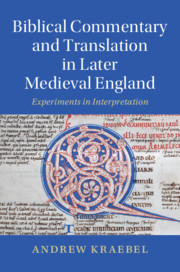Refine search
Actions for selected content:
7 results
Chapter 2 - Oxford
- from Part I - Places
-
-
- Book:
- Gerard Manley Hopkins in Context
- Published online:
- 16 January 2025
- Print publication:
- 16 January 2025, pp 15-22
-
- Chapter
- Export citation
Chapter 4 - Moral Experiments: Middle English Matthew Commentaries
-
- Book:
- Biblical Commentary and Translation in Later Medieval England
- Published online:
- 22 February 2020
- Print publication:
- 05 March 2020, pp 133-175
-
- Chapter
- Export citation
Introduction
-
- Book:
- Biblical Commentary and Translation in Later Medieval England
- Published online:
- 22 February 2020
- Print publication:
- 05 March 2020, pp 1-20
-
- Chapter
- Export citation
Chapter 2 - Eclectic Hermeneutics: Biblical Commentary in Wyclif’s Oxford
-
- Book:
- Biblical Commentary and Translation in Later Medieval England
- Published online:
- 22 February 2020
- Print publication:
- 05 March 2020, pp 54-90
-
- Chapter
- Export citation
Chapter 1 - Interpretive Theories and Traditions
-
- Book:
- Biblical Commentary and Translation in Later Medieval England
- Published online:
- 22 February 2020
- Print publication:
- 05 March 2020, pp 21-53
-
- Chapter
- Export citation
Chapter 3 - Richard Rolle’s Scholarly Devotion
-
- Book:
- Biblical Commentary and Translation in Later Medieval England
- Published online:
- 22 February 2020
- Print publication:
- 05 March 2020, pp 91-132
-
- Chapter
- Export citation

Biblical Commentary and Translation in Later Medieval England
- Experiments in Interpretation
-
- Published online:
- 22 February 2020
- Print publication:
- 05 March 2020
